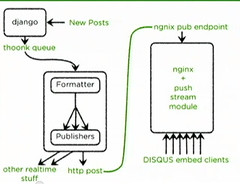The email sent will contain a link to this article, the article title, and an article excerpt (if available). For security reasons, your IP address will also be included in the sent email.

How do you add realtime functionality to a web scale application? That's what Adam Hitchcock, a Software Engineer at Disqus talks about in an excellent talk: Making DISQUS Realtime (slides).
Disqus had to take their commenting system and add realtime capabilities to it. Not something that's easy to do when at the time of the talk (2013) they had had just hit a billion unique visitors a month.
What Disqus developed is a realtime commenting system called “realertime” that was tested to handle 1.5 million concurrently connected users, 45,000 new connections per second, 165,000 messages/second, with less than .2 seconds latency end-to-end.
The nature of a commenting system is that it is IO bound and has a high fanout, that is a comment comes in and must be sent out to a lot of readers. It's a problem very similar to what Twitter must solve.
Disqus' solution was quite interesting as was the path to their solution. They tried different architectures but settled on a solution built on Python, Django, Nginx Push Stream Module, and Thoonk, all unified by a flexible pipeline architecture. In the process they we are able to substantially reduce their server count and easily handle high traffic loads.
At one point in the talk Adam asks if a pipelined architecture is a good one? For Disqus messages filtering through a series of transforms is a perfect match. And it's a very old idea. Unix System 5 has long had a Streams capability for creating flexible pipelines architectures. It's an incredibly flexible and powerful way of organizing code.
So let's see how Disqus evolved their realtime commenting architecture and created something both old and new in the process...














 Return to Article
Return to Article